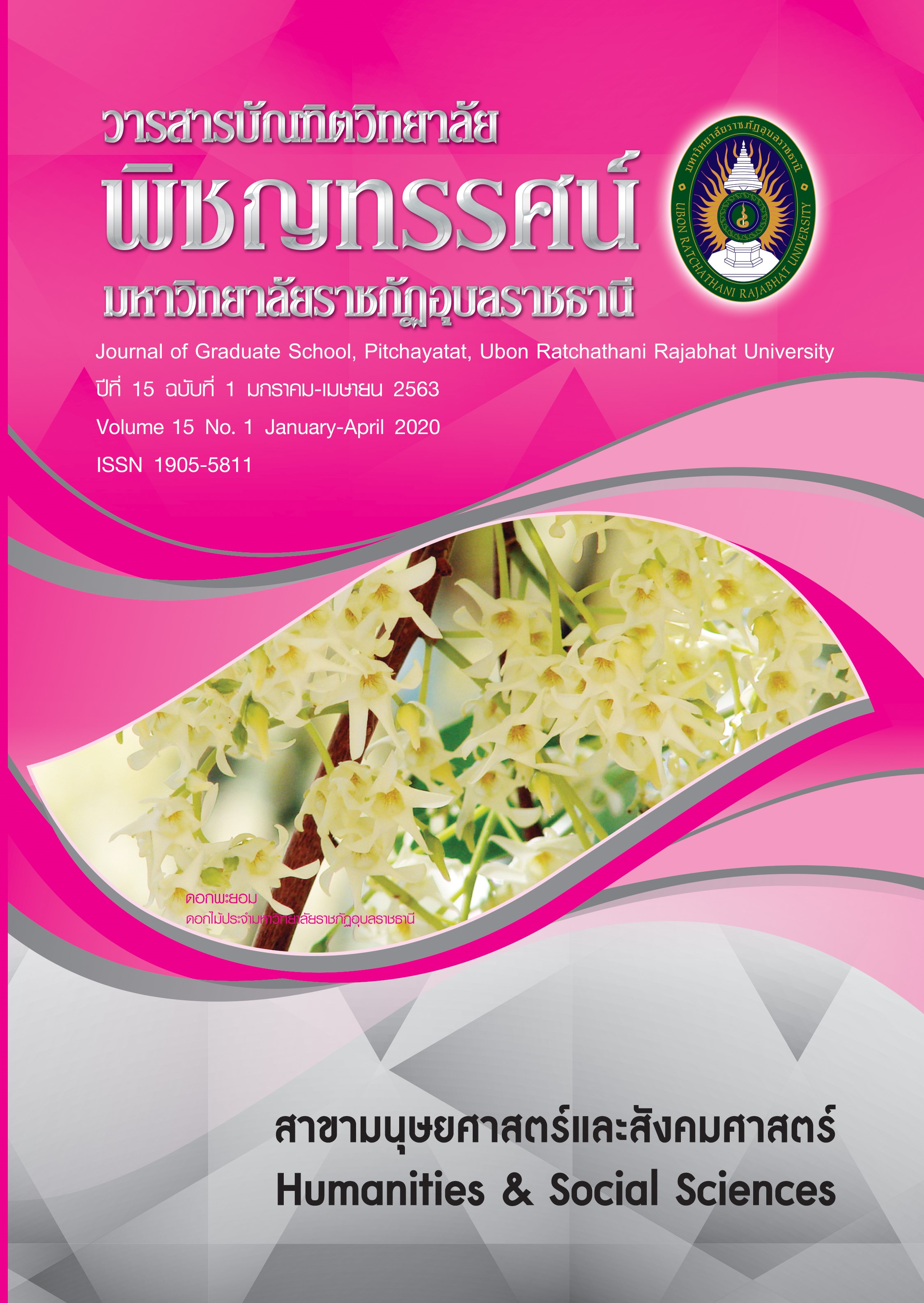แนวทางการพัฒนาความสามารถในด้านการจัดการเรียนรู้ ของพระสอนศีลธรรมในโรงเรียน จังหวัดกำแพงเพชร
คำสำคัญ:
แนวทางการพัฒนาความสามารถ, การจัดการเรียนรู้, พระสอนศีลธรรมบทคัดย่อ
การวิจัยครั้งนี้มีวัตถุประสงค์เพื่อ 1) ศึกษาความต้องการพัฒนาความสามารถในด้านการจัดการเรียนรู้ของพระสอนศีลธรรมในโรงเรียน 2) สร้างและตรวจสอบคุณภาพแนวทางการพัฒนาความสามารถในด้านการจัดการเรียนรู้ของพระสอนศีลธรรมในโรงเรียน 3) ทดลองใช้แนวทางการพัฒนาความสามารถในด้านการจัดการเรียนรู้ของพระสอนศีลธรรมในโรงเรียน 4) ศึกษาความคิดเห็นเกี่ยวกับแนวทางการพัฒนาความสามารถในด้านการจัดการเรียนรู้ของพระสอนศีลธรรมในโรงเรียน กลุ่มเป้าหมายที่ศึกษา ได้แก่ พระสอนศีลธรรมในโรงเรียนจังหวัดกำแพงเพชรทั้งหมด จำนวน 140 รูป ตัวอย่างที่ใช้ในการทดลอง ได้แก่ พระสอนศีลธรรมในโรงเรียน จำนวน 8 รูป ครูสอนกลุ่มสาระสังคมศึกษา ศาสนาและวัฒนธรรม และผู้อำนวยการโรงเรียน จำนวน 12 คน โดยใช้วิธีการเลือกแบบเจาะจง เครื่องมือที่ใช้ในการวิจัยเป็นแบบสอบถาม แบบสัมภาษณ์ แบบประเมินทักษะ และแบบประเมินความพึงพอใจ สถิติที่ใช้คือ ร้อยละ ค่าเฉลี่ย ส่วนเบี่ยงเบนมาตรฐาน และการทดสอบที
ผลการวิจัยพบว่า
- ความต้องการพัฒนาความสามารถในด้านการจัดการเรียนรู้ของพระสอนศีลธรรมในโรงเรียน โดยภาพรวมทั้ง 4 ด้าน มีความต้องการอยู่ในระดับมาก
- วิธีการพัฒนาความสามารถในด้านการจัดการเรียนรู้ของพระสอนศีลธรรมในโรงเรียนมีความเหมาะสมและความเป็นไปได้ในภาพรวมอยู่ในระดับมากที่สุด
- ผลการทดลองใช้แนวทางการพัฒนาความสามารถในด้านการจัดการเรียนรู้ของพระสอนศีลธรรมในโรงเรียนมีดังนี้
3.1 พระสอนศีลธรรมในโรงเรียนมีความรู้ความสามารถในด้านการจัดการเรียนรู้เพิ่มขึ้นอย่างมีนัยสำคัญทางสถิติที่ระดับ .05
3.2 ทักษะปฏิบัติด้านการจัดการเรียนการสอนของพระสอนศีลธรรมโดยภาพรวมอยู่ในระดับดี
3.3 ความพึงพอใจต่อความสามารถในด้านการจัดการเรียนรู้ของพระสอนศีลธรรมในโรงเรียนโดยภาพรวมอยู่ในระดับมากที่สุด
- ความคิดเห็นเกี่ยวกับแนวทางการพัฒนาความสามารถในด้านการจัดการเรียนรู้ของพระสอนศีลธรรมในโรงเรียนโดยภาพรวมอยู่ในระดับมากที่สุด
เอกสารอ้างอิง
วัฒนธรรม, กระทรวง. คู่มือการดำเนินงานตามโครงการครูพระสอนศีลธรรมในโรงเรียนปีงบประมาณ 2549. กรุงเทพฯ: โรงพิมพ์องค์การรับส่งสินค้าและพัสดุภัณฑ์ (ร.ส.พ.), 2549.
คณะกรรมการการศึกษาขั้นพื้นฐาน, สำนักงาน. ขอบข่ายงานวิชาการในโรงเรียนมัธยมศึกษา. กรุงเทพฯ: คุรุสภาลาดพร้าว, 2553.
จิตติพร ทรรศนียากร. การศึกษากระบวนการพัฒนาครูผู้สอนด้านการจัดทำแผนการจัดการเรียนรู้ที่เน้นผู้เรียนเป็นสำคัญของโรงเรียนสหศาสตร์ศึกษา อำเภอเมือง จังหวัดเชียงราย. วิทยานิพนธ์ครุศาสตรมหาบัณฑิต มหาวิทยาลัยราชภัฏเชียงราย, 2552.
ธนบดี บัวใหญ่รักษา. แนวทางในการพัฒนาครูในการจัดการเรียนการสอนที่เน้นผู้เรียนเป็นสำคัญ. วิทยานิพนธ์ ครุศาสตรมหาบัณฑิต มหาวิทยาลัยราชภัฏเลย, 2550.
พระสอนศีลธรรม,สำนักงาน. แผนยุทธศาสตร์พระสอนศีลธรรมในช่วงแผนพัฒนามหาวิทยาลัยมหาจุฬาลงกรณราช วิทยาลัย ฉบับที่ 11 (2555-2559). พิมพ์ครั้งที่ 2. กรุงเทพฯ: หจก.เชนปริ้นติ้ง, 2558.
รุ่งทิวา จันทน์วัฒนวงษ์. การพัฒนารูปแบบการส่งเสริมความสามารถของครูในการออกแบบกิจกรรมการเรียนการสอนที่เน้นการพัฒนาทักษะการคิดในศตวรรษที่ 21. วิทยานิพนธ์ครุศาสตรมหาบัณฑิต มหาวิทยาลัยราชภัฏอุดรธานี, 2559.
สุวัฒน์ ศรีจันทวงศ์. แนวทางพัฒนาการจัดการเรียนการสอนที่เน้นผู้เรียนเป็นสำคัญ. วิทยานิพนธ์ครุศาสตรมหาบัณฑิต มหาวิทยาลัยราชภัฏเลย, 2550.
ดาวน์โหลด
เผยแพร่แล้ว
รูปแบบการอ้างอิง
ฉบับ
ประเภทบทความ
สัญญาอนุญาต
บทความทุกเรื่องได้รับการตรวจความถูกต้องทางวิชาการโดยผู้ทรงคุณวุฒิภายนอกอย่างน้อย 3 คน ความคิดเห็นในวารสารพิชญทรรศน์เป็นความคิดเห็นของผู้นิพนธ์มิใช่ความคิดเห็นของผู้จัดทำ จึงมิใช่ความรับผิดชอบของวารสารพิชญทรรศน์ และบทความในวารสารพิชญทรรศน์สงวนสิทธิ์ตามกฎหมายไทย การจะนำไปเผยแพร่ต้องได้รับอนุญาตเป็นลายลักษณ์อักษรจากกองบรรณาธิการ





